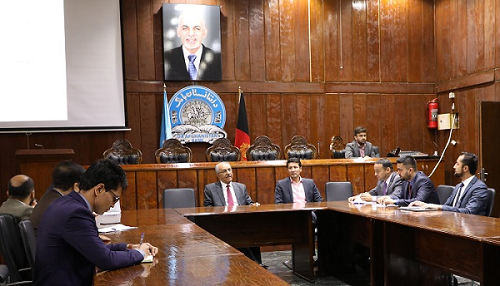Financial Inclusion Department Briefed on its Performances to DAB’s Executive Board

Kabul, June 20, 2019 – Financial Inclusion Department presented its performances and activities’ report to the executive board of Da Afghanistan Bank.
According to this report, simultaneously with the establishment of the department on January 14, 2017, training programs were conducted aimed to raise staff capacities in various areas including financial sector terms and definitions, principles of statistics and analysis, microeconomic and public economic phrases as well as financial inclusion development. The department staff completed and received a World Bank-funded six-month professional certificate course on “financial inclusion development policies” provided online by Frankfort Financial and Management University.
The report further provides that FID with the technical assistance of World Bank has designed supply side questionnaires and delivered them to financial institutions like banks and e-money institutions through holding various training programs, based upon which desired statistics and data has been collected and it is expected that figures and data of FY 1398 will be filled and submitted online by financial institutions. Moreover, Financial Inclusion’s Task Force - whose members are the central bank, ministry of finance, Afghanistan Banks Association and MISFA – has been established under the chairmanship of Governor of Central Bank and secretariat of financial inclusion department. The members have convened three functional meetings on finalization of diagnostic studies list, finalization of list of relevant institutions involved in FID’s national committee, list of central bank’s relevant departments for establishment of internal committee.
FID has managed to establish national financial inclusion committee comprised of 25 State, private and international organizations which aims to build a comprehensive consultative framework together with its members, as well as discuss on their policy commitments. FID, in consultation with Task Force members and World Bank, has completed diagnostic studies in seven different areas including financial consumer protection, development of financial inclusion and integration of financial sector, financing of micro, small and medium enterprises and payment infrastructure.
Further achievements of FID include completion of regulation on financial consumer protection, regulation on banking without branches and banking circulars via mobile in harmony with financial supervision department. In development of financial inclusion and integration of financial sector, FID is fully involved in analyzing national money-laundering risks which is principally managed by FinTRACA. FID has also made tremendous achievements towards raising financial knowledge of the people such as preparing and publishing of book titled “Financial and Banking Phrases in Simple Words” which is part of the effort made towards public awareness. It has to be noted that mentioned tasks are carried out in two stages, the first one focus on drafting of national financial inclusion strategy and the second stage is about implementation, monitoring and evaluation of this strategy.
It is important to mention that currently FID is working on various studies including on financial inclusion development policies, development of infrastructure of financial sector, financial services and gender to strengthen policies and its respective measures. It is intended that with its completion, certain policy measures will be submitted to DAB’s Senior Management.
